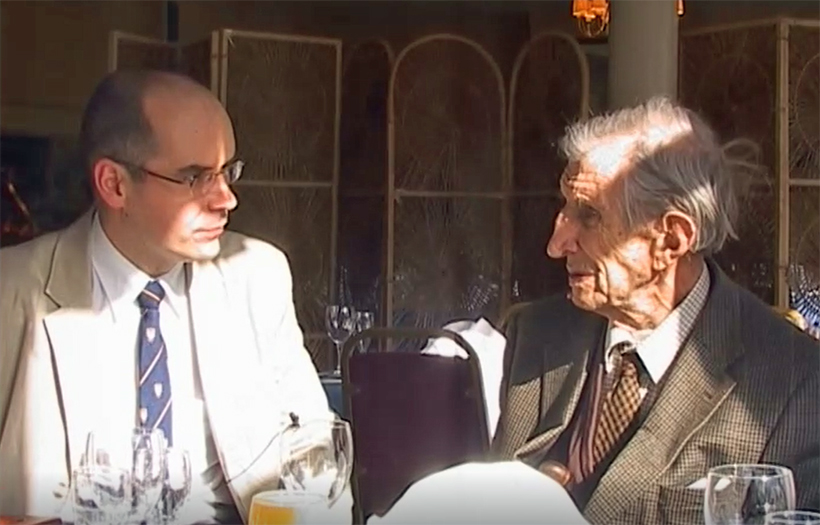
|

The last filmed Interview with Sir Wilfred Thesiger KBE, DSO, FRAS, FRSL, FRGS
In 2001 I had read a book called The Danakil Diary and was planning to lead a trip into the Danakil myself. I knew next to nothing about Ethiopia so I took it upon myself to trace the author of the book. To be honest, as the book recounted an expedition undertaken 70 years earlier I did not hold out much hope. As luck would have it I traced Sir Wilfred Thesiger to a retirement home, Orford House, in Coulsdon, Surrey. Very close to where I lived at the time. After an initial exchange of letters he agreed to me meeting with him and, as we enjoyed each other's company so much, this soon became a monthly occurrence. It didn't take long for him to ask me to drop the formalities and to simply call him Wilfred. This is when I realized we had become firm friends 
Wilfred was born in Abyssinia, now called Ethiopia, where his father was Consul-General. For many years Wilfred, together with his brother were the only European children there. He later recalled how impressed he had been seeing a tribal army armed with swords and spears, marching in Addis Ababa having had a great victory. Wilfred said about it 'That day made a profound impression on me, implanting a craving for barbaric splendour, for savagery and colour, from which derived a lasting respect for tradition and a readiness to accept a variety of long-established cultures and customs. I grew to feel an increasing resentment towards Western innovations in other lands and a distaste for the dull monotony of our modern world.' Wilfred was educated at St Aubyn's School in Rottingdean, followed by Eton College and then Oxford University. Whilst at Oxford, he became Treasurer of the Oxford University Exploration Club. In 1930 he returned to Africa, having received an invitation from Emperor Haile Selassie to attend his coronation. He returned again in 1933 as the leader of an expedition to explore the course of the Awash River. Wilfred then served with the Sudan Political Service and, at the outbreak of WW2, he joined the Sudan Defence Force and was awarded the DSO for capturing Agibar and its garrison. He later served with the Special Operations Executive and the SAS. After WW2, Wilfred travelled across Arabia, lived for some years in the marshes of Iraq, and then travelled in Iran, Kurdistan, French West Africa and Pakistan. He lived for many years in northern Kenya with the Samburu. He is particularly well known for two travel books; Arabian Sands and The Marsh Arabs. In the decades that have passed since his death I have re-traced some of his journeys in both Ethiopia and over several visits to the Marsh Lands of southern Iraq. Though Wilfred, in view of his unique life and many accomplishments, was not known for granting many interviews he allowed me to set one up. I engaged a TV production company and we spent a day filming at Orford House, my then house in Wallington and at Coulsdon Manor Golf Club over lunch. Those six tapes from March 2003 may well be the last filmed interview that Wilfred ever gave. Sadly, he died in August of that year. During the few years that I knew Wilfred I met him nearly twenty times and we discussed many of his trips and mine. He was fascinated when I brought back photographs from Ethiopia of the hut where he had been born and places that had been familiar to him as a youngster. We even met his biographer, Alexander Maitland in his former home in London. It was not until many years later that I discovered Alex's first wife is related to me through marriage. I was honoured to have been invited to his Memorial Service which was held at Eton College Chapel on 7 November 2003 and attended by the 'Who's Who?' of exploration. A fitting send off for such an incredible man. |
|
|